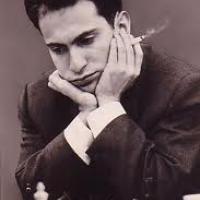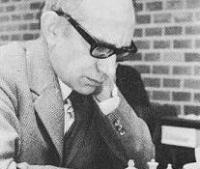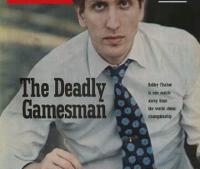
That is how I Play
 Mikhail Nejemevich Tal was born in Riga, Latvia on November 9, 1936. He was a genuine child prodigy: at three years old he read perfectly, at five he multiplied three digit numbers in his head. His father was a physician and Tal became interested in chess when he saw his father playing in the waiting room. However, it was not until he was in his teens that he began to study the game seriously. Tal soon became obsessed with the game: he learned the rules of the game from his cousin, and he played as often as he could.
Mikhail Nejemevich Tal was born in Riga, Latvia on November 9, 1936. He was a genuine child prodigy: at three years old he read perfectly, at five he multiplied three digit numbers in his head. His father was a physician and Tal became interested in chess when he saw his father playing in the waiting room. However, it was not until he was in his teens that he began to study the game seriously. Tal soon became obsessed with the game: he learned the rules of the game from his cousin, and he played as often as he could.
Alexander Koblents began tutoring Tal in 1949, and Tal's game rapidly improved. By 1951 he had qualified for the Latvian Championship. In the 1952 Latvian Championship, Tal finished ahead of his trainer. Tal won his first Latvian title in 1953, and was awarded the title of Candidate Master. He became a Soviet Master in 1954 by defeating Vladimir Saigin in a qualifying match. That same year he also scored his first win over a Grandmaster when Yuri Averbakh lost on time in a drawn position. Tal graduated in Literature from the University of Riga; defending his thesis on the subject of satire in the novel "The Twelve Chairs" by Ilf Petrov.
Tal participated in the semifinals of the USSR championship in Vilnius in 1955 and finished tied for 3rd-4th place; Tal first qualified for the USSR Chess Championship final in 1956, finishing fifth, and became the youngest player to win in the following year, at the age of 20 with 9 wins, 10 draws, and 2 losses, ahead of Paul Keres and David Bronstein. He had not played in enough international tournaments to qualify for the title of Grandmaster, but FIDE decided at its 1957 Congress to waive the normal restrictions and award him the title because of his achievement in winning the Soviet Championship.
In 1958 Tal won the 25th USSR championship and Zonal with 10 wins, 5 draws, and 3 losses. At the Portoroz, Yugoslavia Interzonal in 1958, Tal took first place with 8 wins, 11 draws, and 2 losses. This was 2 1/2 points ahead of the rest of the field. Tal had the best individual score at the 13th world team tournament, the Munich Olympiad. He was the gold medalist with 13 1/2 out of 15, scoring 90 percent and no losses. In this Olympics, Botvinnik asked why sacrifice a pawn? And Misha answered "that is how I play."
In 1959 Tal took second place, behind Tigran Petrosian, at the 26th USSR championship. He won Zurich with 10 wins, 3 draws, and 2 losses. In October he won the Bled-Zagreb-Belgrade Candidates tournament with 16 wins, 8 draws, and 4 losses. He thus became the challenger for the world chess championship.
In March 1960 Tal began his match with world champion Mikhail Botvinnik in Moscow. Tal won the match with a score of 6 wins, 13 draws, and 2 losses. At age 23, he became the youngest world champion to date. In 1985 Garry Kasparov beat his record by becoming world chess champion at 22 years, 210 days. A year later in Moscow Tal lost a rematch with Botvinnik for the world championship.
Soon after losing the rematch with Botvinnik, Tal won the 1961 Bled super tournament by one point over Fischer, despite losing their individual game, scoring 14½ from nineteen games (+11 -1 =7) with the world-class players Tigran Petrosian, Keres, Gligoric, Efim Geller, and Miguel Najdorf among the other participants.
In 1962 Tal began play at the Curacao Candidates tournament, but had to withdraw because of serious health problems. That same year Tal came in second at the USSR championship, behind Korchnoi, with 11 wins, 5 draws, and 3 losses.
Tal tied for first place at the Amsterdam Interzonal of 1964 and again became a Candidate; in 1965 he defeated Lajos Portisch in the quarter-finals, defeated Bent Larsen in the semi-finals, but lost to Boris Spassky in the final match.
From July 1972 to April 1973 Tal played 86 games in international competition without defeat. He won 47 games and 39 drawn. He won the 1972 USSR championship and took first place at Wijk aan Zee 1973 and Tallinn 1973. He also had this gem in the 1974 USSR championship:
In 1988 Mikhail Tal won the world blitz championship.
Tal died of kidney failure in Moscow on June 28, 1992 at the age of 55. Of the current top-level players, Alexei Shirov and Alexander Shabalov have probably been most influenced and inspired by the sacrificial style of Tal leading some to speak of a "Latvian School of Chess.






